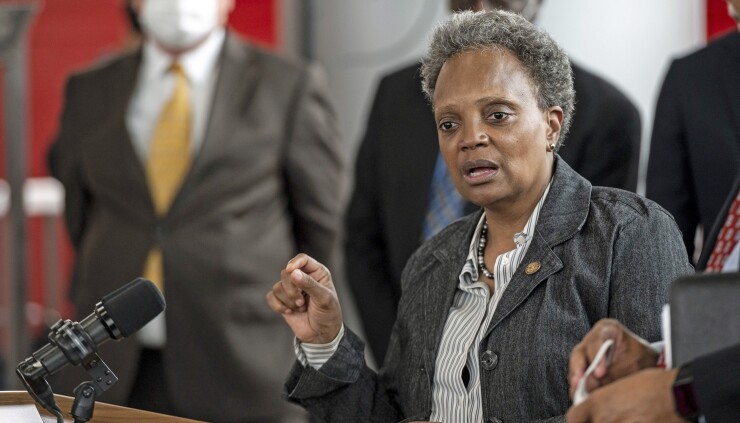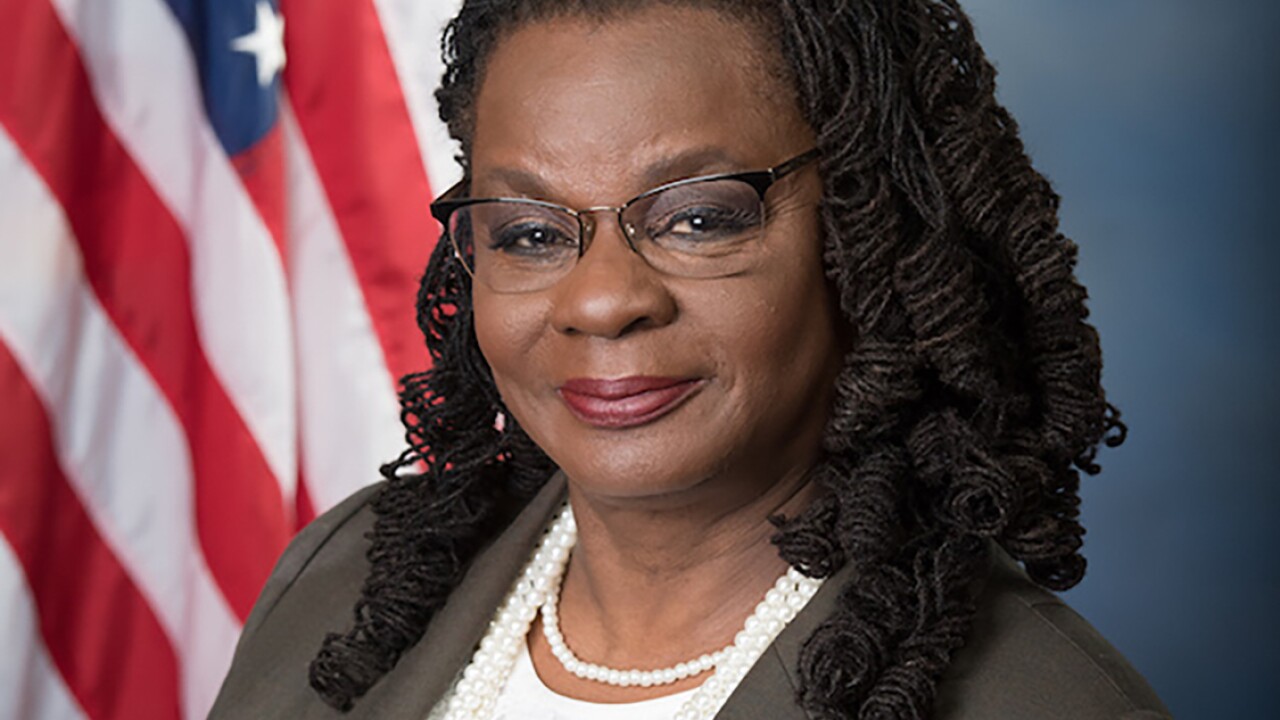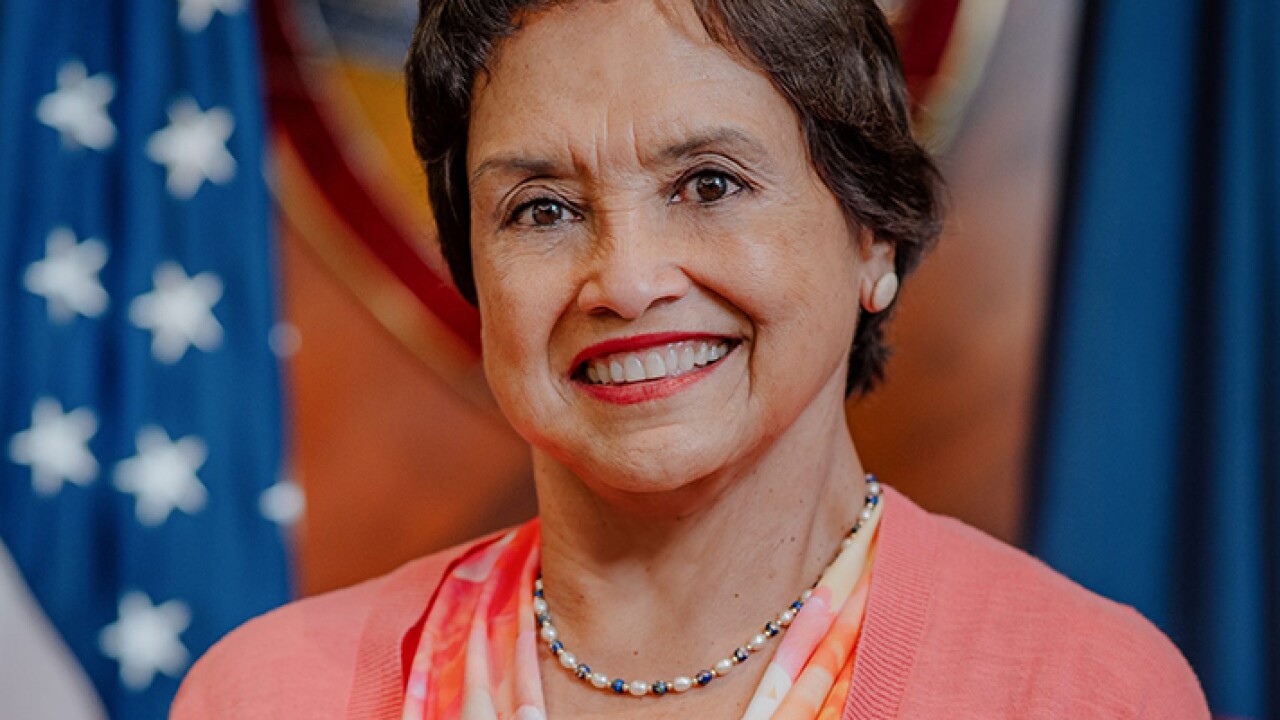Chicago Mayor Lori Lightfoot plans to use $1.3 billion of the city’s $1.9 billion in federal coronavirus aid for budget relief through 2023 with the remainder, and $660 million of borrowing, funneled toward social, economic and infrastructure recovery initiatives.
Lightfoot presented
The city suffered $1.5 billion of lost revenue — $885 million in 2020 and $570 million in 2021 — that is eligible under U.S. Treasury guidance for ARPA funding to replace pandemic-related losses.

“Our first step in this time of lost revenues is closing our gaps in lost revenue for 2021 and addressing the deficit for 2022…and we propose to do this without any new taxes, no reduction in city services, and no layoffs,” Lightfoot said in her budget address Monday, dubbing the spending package a “Recovery and Resilience Budget.”
The budget does however raise the property tax levy based on previously approved capital spending and an annual increase tied to inflation as well as new property coming on to the tax rolls.
The administration will tap $782 million of the $1.9 billion federal pot to cover eligible costs through the second half of 2021. The city also now plans to further dip into that pool of funds for $385 million to help close the $733 million 2022 gap and would reserve $152 million for the 2023 budget.
The $385 million represents a one-time revenue stream that won’t be available next year. Another one-time source will come from a tax-increment surplus declaration of $24.9 million beyond what was p
Another $63 million will come from natural tax revenue growth and $18.6 million in expected property tax growth from new properties coming online, both recurring streams.
The budget would close nearly $300 million of the gap through various cost savings and efficiencies related to fiscal management, cost recovery, healthcare, and personnel savings. The revenue and expense measures generate an additional $56 million in available revenue for proposed investments in various initiatives.
The city will see $22 million in 2022 debt service savings from a planned $1.2 billion refinancing although the bulk of savings, $232 million, is being taken up front this year to help cover the $272 million retroactive price tag of a new police contract.
“The market has improved and we think we will generate a little more in savings” to capture in 2022, Chicago Chief Financial Officer Jennie Huang Bennett said in a call with reporters Tuesday.
Budget details
The all-funds $16.66 billion budget Lightfoot proposed for next year, up from $15.12 billion this year, includes a $4.88 billion corporate fund that’s up $864 million from this year.
City Council hearings begin on Friday.
Rising pension and debt costs continue to hammer the city’s budget but Bennett stresses that the most daunting hurdles are overcome in 2022 easing the work of reaching structural balance by the city’s 2023 target.
“As it relates to the ongoing financial plan and the structural balance by 2023 a lot of what we are facing as it relates to the gap that exists and will persist into next year really has to do with revenue loss due to COVID. We are still recovering. There is still room for us to continue to see recovery,” Bennett said. “That full recovery is still in front of us.”
In addition to growing tax revenues, Bennett said the city will have climbed the pension and debt service ramps next year with more modest annual increases in future years and the city expects several hundred million dollars more in the coming years from a yet-to-be-built casino. Developer proposals are due later this fall.
The budget makes the full $2.3 billion payment owed to its four pension funds, up by $461 million this year because 2022 is the first year an actuarially based contribution is being made for all four city pension funds.
Despite the increases, the funds remain frail. The
The city also will see debt service rise by about $400 million to $784 million next year. “Now the city will be amortizing $200 million to $300 million of principal annually,” Bennett said. For years, prior mayors scooped-and-tossed debt service.
The budget also pays off $450 million of short-term borrowing the city turned to last December to help make up for 2020 pandemic hits as it waited to see whether the federal government would pass a new stimulus package after Joe Biden took office in January.
In the absence of additional funding, the city intended to roll that $450 million into a scoop-and-toss debt restructuring that would also have pushed off $500 million owed in 2021. The city dropped the long term restructuring after ARPA was signed in March but the city must use its own revenues to pay off the loan as guidance bans ARPA dollars going to pay off debt. The city will pay off the JPMorgan line after the new budget is approved later this year.
City reserves of about $1 billion will hold steady including fund balances, Bennett said, and the city will replenish a $30 million 2021 draw but it won’t make an annual $5 million contribution into its rainy day fund in 2022.
The city will declare a total TIF surplus of $271.6 million with $67 million staying with the city and $150 million going to Chicago Public Schools.
While council members who have pressed Lightfoot to direct more federal funds toward social programs will likely welcome the recovery proposals, they might push for more and could also take issue with plans to raise the police budget by $200 million to $1.9 billion with most of the increase earmarked for personnel expenses. Others might push for more.
Lightfoot will face some pushback for saying the budget lacks any tax hikes. The property tax levy will actually grow by $76.5 million. That includes $25 million for previously approved capital bonding, $22.9 million under a scheduled increase based on the consumer price index — a change approved last year — and $28.9 million expected from new property and an already approved bond issue.
After withdrawing $1.3 billion for budget relief, the administration will use the remaining ARPA funds along with $660 million of new general obligation borrowing to fund social, climate, environmental affordable housing, violence prevention, homeless reduction, economic, health and other infrastructure investments under a $2.5 billion Local Fiscal Recovery Fund package. Many are one-time in nature so not to further burden the city’s future fiscal condition.
Borrowing
The city is still on tap to issue the $1.2 billion refinancing late this year.
The city will tap short-term credit lines — it has an existing one from JPMorgan and another is in the works — to raise initial funds for both the $3.7 billion multi-year capital budget approved last year that depends on $1.6 billion of new borrowing over several years as well as the newly proposed $660 million that won’t fully be tapped in 2022. A total of $1.8 billion of borrowing is expected through 2025 for capital and the recovery plan.
“We are going to closely match the timing of the issuances to our cash flow needs so rather than issue bonds upfront and have proceeds sit around until you spent it, we will use the interim line of credit to most closely match the actual capital spend to our borrowing needs,” Bennett said.
The city doesn’t intend to raise the property tax levy to repay the $660 million of new borrowing.
The city is also planning on interim O'Hare airport financing this year.
The finance team is watching federal action on the infrastructure and budget reconciliation packages closely to see if the
The city has about $400 million of bonds callable in 2024 and another $800 million in 2025 and the savings “would be meaningful” in the range of $100 million to $200 million if able to do the refundings on a tax-exempt basis based on current interest rates and tax-exempt to taxable ratios, Bennett said.
Pension obligation bonds would be considered only if coupled with payment reforms and none are on the table at the city or state level.
The city is rated Ba1 by Moody’s Investors Service, which recently revised the outlook to stable from negative; A by Kroll Bond Rating Agency, which recently
Council members offered mixed assessments. Alderperson Ray Lopez, a Lightfoot critic, attacked the plan.
“This budget falls woefully short of meeting the needs and challenges of the city of Chicago,” Lopez said on WTTW’s Chicago Tonight. “There is nothing new or sustainable in this budget despite the fact that she says this is about resilience and recovery,” he said.
“We're seeing a great balance between investing in communities that need the investments, mental health across-the-board and at higher levels than we've ever seen,” said Alderperson and Finance Committee Chair Scott Waguespack. “It seems to me that the finance team is really doing a great job of trying to get the city into a much better position on the pensions and what seems to be also a great position on is great position on paying down debt.”





